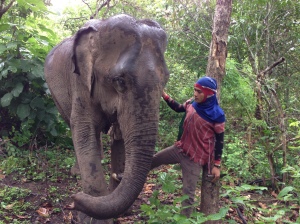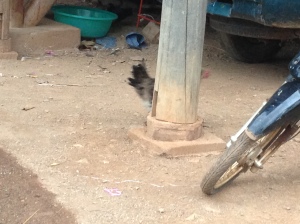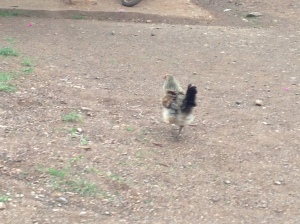This post is the next installment in a series about my trip to Thailand to volunteer helping elephants.
THE VOLUNTEERS, PART ONE
A person like me needs to be tricked into making friends with people. I can’t seem to do it directly.
When meeting a person for the first time, I guess my ego is so concerned with making a good impression that I never register the person’s name the first time I hear it. This puts me at a disadvantage immediately. I’ve considered asking the person if they would slap me after telling me their name, like, “Hi Mike, my name is Joe”—thwack!—across the face. Now I will surely remember Joe.
Beyond that, my natural state is hermit crab-shut. I am not much of a joiner, a Meeter-Upper, Grouponer, or group-anythinger.
When I watched I am Legend, with the solitary guy walking the empty post-apocalyptic streets accompanied only by his dog (although in my opinion the older, better version of this movie is The Omega Man with Charlton Heston), I was not thinking, “Oh, that poor lonely guy”—I was thinking, “Hey, cool—sign me up!” I could talk to the dog and I could shoot the heads off zombies, all by myself. I mean, it just doesn’t get any better than that.
But, I am willing to confront my weaknesses… this is another reason why I jumped head-first into this adventure in Thailand.
I wanted to be tricked.
One of the first people I meet on this trip is Mallory. She has just graduated from college in Vermont before embarking on the volunteering adventure here—this is a common theme for many of the young volunteers. Most of them choose to do this elephant trip as their major “gap year” activity, seeking out a grand adventure before transitioning to adult job, career, or even more higher learning.
At breakfast before the long ride to Huay Pakoot, Mallory asks to sit at my table. We had met briefly at the orientation meeting the night before, but of course I have to ask her name again.
“Mallory,” she tells me, and slaps me across the face. She packs a punch—it feels like I’ve just been struck with a very large dead fish, maybe a tuna.
Kidding.
But Mallory seems to set things in motion—she tips the first domino, and they start to topple. Other young volunteers join us at the table, and the hermit crab begins to poke his head out.
Curiosity also trumps shyness with me—this is why it is easy for me to break the ice with the staff running the program—because I am constantly asking them questions.
Gemma is the Base Leader in charge of the rest of the staff, as well as a liaison to the Karen People in the village and the go-to for all the volunteers. She runs the place and participates in all the activities the volunteers do.
On hikes Gemma will stop everyone so she can take eighty pictures of a millipede zigzagging across the jungle floor. That’s one way the friendship with her develops on my end—her passion for bugs, birds, rodents, the entire diverse population of the jungle itself, big and small, insect and elephant—it all rubs off on me. Her enthusiasm is contagious.
Plus with all the things she has to do, all the details big and small, she always has time for asking me, “How you going then, Mike? You alright?” (She’s British—and that’s another thing—since the Brits comprise most of the staff and volunteers, they begin rubbing off on me too, both their accents and their even-keeled natures.)
Susi, a staff member originally from Paraguay, is similarly passionate about the surroundings, although my connection with her is initially through her facility with Packinyah, the language of the Karen people. For the first week in Huay Pakoot she accompanies me on dinners with my host family.
My family loves Susi because she is a charging bull about learning the language and communicating with them. I scribble down as much as I can while I listen to them chattering in Packinyah and broken English like excited chipmunks.
Susi also has a bombastic, haw-haw-haw laugh. It seesaws from gasping breaths to sledgehammering guffaws, and when I watch her laugh I can see that she holds nothing back—it comes from deep inside her. I have a bit of an explosive laugh too, so I know that laughs like that are contagious. Susi laughs a lot.
Tammy is another staff member, an unflappable Australian who is eager to help always, and she crams as much information about the elephants and the village as I can fit into my cranium.
On one hike while I am taping popsicle sticks into crosses and dousing myself with holy water to ward off the leeches, one of them burrows into Tammy’s ankle. Her foot turns into a blood fountain, and she barely breaks stride.
Kerri is a brand new staff member from Ireland who I share a wild Sung Tao truck ride with when I have to get emergency dental work done in Chiang Mai. During the ride with her I am in the unusual position of answering her questions about what it’s like in Huay Pakoot, since this will be her first time there. It feels good to be the teacher rather than the student for a little while.
All of the staff people are open and seem to genuinely enjoy their jobs. When I am radioactively glowing about an amazing experience that I’ve had on any particular day, they get excited that I am excited.
But in the end, I discovered that the best way to be tricked into making friends is to be thrown into the middle of a jungle with about 20 other people who, like you, don’t know the local language or customs, and are as baffled as you are by bug swarms, leech attacks, 90-degree climbs, perpetually dirty feet, and especially by being five feet away from wandering elephants for large parts of the day.
And don’t forget eating meals together, washing dishes together, and sharing the same squat toilet. And take away the Internet—or even better, put the Internet up at the top of a mountain and make it super-slowww and prone to bailing out, like playing poker with a sea turtle, so you have to actually work at being antisocial—and sooner or later, the wool gets pulled over your eyes. You get tricked into making friends with other people.
When I faltered, Mallory was there to say hi to me… then slap me with a dead fish.


























